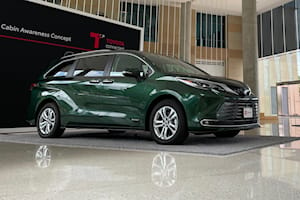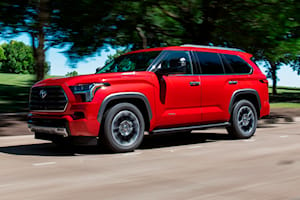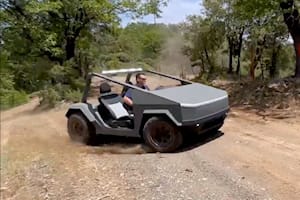Combine unprecedented fuel economy and low-emissions with core family-centric values such as safety and reliability, and you get what makes Toyota hybrids so exceptional. They’re modern and well-balanced daily runabouts and family cruisers and they’re taking over the USA faster than ever. Now, in 2020, there are more alternative-fuel automobiles than one could fathom in every classification; from hatchbacks to sedans and even hybrid SUVs.
Common Specifications of Toyota Hybrid Vehicles
- Performance: New Toyota hybrids are predominantly purposed to deliver a comfortable and smooth ride quality. This means that they’re typically rather sedate and can be rather boring for any driving enthusiast.
- Powertrain: Typically, these transports utilize a small to medium-sized engine with an automatic gearbox directing outputs. Horsepower and torque are usually level, if the latter doesn’t exceed the former. A front-wheel drivetrain is common for the class and brand, though some variants do offer all-wheel-drive stock.
- Features: Because hybridized machines are quite a bit pricier than their gasoline-powered counterparts, they typically arrive comprehensively specced with creature comforts and conveniences at the base level.
Toyota Hybrid and Plug-In Hybrid Models List
The following make up the Toyota models list for the segment:
- Avalon: This sporty, full-size sedan features a 2.5L mill with an automated continuously variable transmission sending outputs to the front wheels.
- Camry: A 2.5-liter four-cylinder, continuously variable transmission, and FWD setup take care of business in the Camry. Derived from one of the brand’s most famous midsize sedans, the hybrid variant takes fuel efficiency to the next level.
- Corolla: This version of the midsizer is critically acclaimed for its exceptionally efficient 1.8-liter inline-four and ECVT powertrain. It is sold purely as a front-wheel-driven with no other guise offered.
- Highlander: This midsize, three-row cruiser is propelled by a burly 2.5L mill tethered to a CVT. All four of the trims are available in either FWD or AWD. This auto is at the top end of the rankings for several factors, including its ability to tackle snow.
- Prius: This frugal hatch runs off a 1.8L four-pot unit and CVT with the front wheels receiving all the charge. The Prime is the PHEV version of the nameplate and achieves 25 miles of distance on electrons alone.
- RAV4: Under the hood of this popular SUV is a 2.5L four-cylinder engine mated to a CVT and AWD system. The 2021 release of the Prime is certified as our best Toyota plug-in hybrid with a BuzzScore rating of 9.1 out of ten. This variation is equipped with a 302 hp inline-four unit, which means it is the most powerful RAV4 ever built.
- Venza: Scheduled to debut in 2021, the Venza will have a 2.5L four-pot at the helm with an AWD setup constituting the drivetrain. It is classified as a cross between an SUV and a wagon, with three trims making up the lineup.
Pricing of Toyota Hybrids
| Model |
Power |
Engine |
Base Price |
| Toyota Avalon Hybrid |
215 hp |
2.5L Inline-4 Hybrid |
$37,850 |
| Toyota Camry Hybrid |
208 hp |
2.5L Inline-4 Hybrid |
$27,980 |
| Toyota Corolla Cross Hybrid |
194 hp |
2.0L Inline-4 Hybrid |
TBC |
| Toyota Highlander Hybrid |
186 hp |
2.5L Inline-4 Hybrid |
$39,555 |
| Toyota Prius |
121 hp |
1.8L Inline-4 Hybrid |
$25,075 |
| Toyota RAV4 Hybrid |
219 hp |
2.5L Inline-4 Hybrid |
$29,575 |
| Toyota Sequoia |
437 hp |
3.5L Twin-Turbo V6 Hybrid |
TBC |
| Toyota Sienna |
189 hp |
2.5L Inline-4 Hybrid |
$34,460 |
| Toyota Tundra Hybrid |
437 hp |
3.5L Twin-Turbo V6 Hybrid |
$53,000 |
| Toyota Venza |
176 hp |
2.5L Inline-4 Hybrid |
$32,670 |
What to Consider Before Buying
With more and more alternative-fuel machines flooding the automotive industry, it is not surprising that there is a lengthy list of Toyota hybrid cars. However, this does make it a little more difficult to make a choice. That is why you should check out the CarBuzz buyer’s guide reviews and comparison tool. Here, we include every motor proffered on the US market, new and used, and extrapolate on everything from performance to value for money. Below is just a small list of pros and cons that Toyota’s hybrid vehicles possess:
Pros
- Exceptionally fuel-efficient and economical
- Some of the most reliable motors around
- Eco-friendly operation with zero emissions
Cons
- Mundane and unengaging drive dynamics
- The technology compromises cargo capacity
- Many new models are still devoid of Android Auto
FAQs
What is the cheapest hybrid car from Toyota?
The Corolla Hybrid sedan, with its starting MSRP of around $23k, is the most affordable Hybrid Toyota model from the selection.
What is better, an HEV or plug-in HEV?
PHEVs usually have more powerful and larger batteries than their HEV counterparts. This avails them with a bit of an all-electric driving range, usually capped below 100 miles. This pushes up their price a little, though. However, their lower cost of running saves money in the long run.
Do you need to charge a hybrid car battery?
Not for standard hybrids, because the electrical components in these types of automobiles are small, they utilize a technology referred to as regenerative braking. This is when the system uses the energy created by the brakes to recharge.





